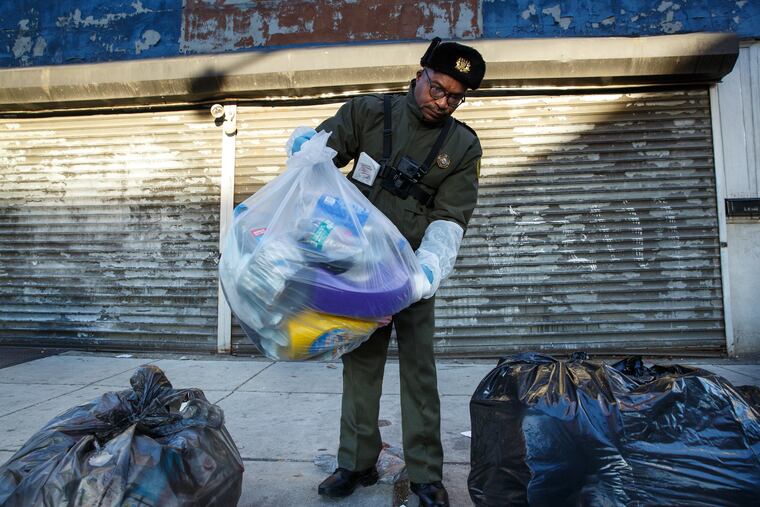Here’s why you shouldn’t bash the trash cops
Don't just SWEEP this Philadelphia program under the rug.

Think twice before dumping.
Every day, more than 50 uniformed employees scour the city, armed with ticket-writing power, challenged with pushing back against serial litterers, and tasked with educating the trash-illiterate. An army of trash cops.
Lately this team has come under question through Curious Philly, a forum for readers to tell our journalists what they're wondering about their communities. A reader asked how the city can spend taxpayer money on a trash and recycling enforcement agency at a time when city schools are fighting for scraps.
But according to Keith Warren, deputy streets commissioner of sanitation, these are no bottom feeders.
"It's not a budgetary issue," he said. "SWEEP officers write citations, those citations get paid, and it is generally more than enough revenue to cover the operating costs."
Uh, what is SWEEP?
SWEEP, shorthand for the Streets & Walkways Education and Enforcement Program, was created 25 years ago, Warren said, "to educate Philadelphia citizens about their responsibilities under the Sanitation Code."
The Streets Department, according to the mayor's 2018 operating budget, will shell out almost $2.9 million on the program, a 9 percent increase from 2017.
SWEEP carries 61 full-time employees, of which 52 are "clean block officers," or trash cops. They are paid between $36,594 and $39,930 a year.
>> MORE CURIOUS PHILLY: Why Philadelphia's Suburban Station is in the heart of the city
On daily patrol, they're answering ripe gripes through the city's 311 Contact Center, and watching out for unusual piles. They dig through trash bags and debris, searching for names or hints of the illegal dumpers who have broken the city's litter laws, and then assign fines of up to $300.
Last year, SWEEP officers issued about 111,905 citations, from which the program raised about $3.2 million.
Although the program is not intended as a revenue generator, Warren said, "the amount of citations SWEEP issues each year pays for the program."
The program keeps data on all dumpers, including a list of the trashiest offenders, and a timeline of when junk justice was served.
"This city is under siege from litter, blight, and dumping," Warren said. "SWEEP is a small, small tool in the fight."
But how effective is the program at dissuading dumpers?
"We are very effective in the education portion of it," Warren said. "A lot of people don't understand the rules of responsibly setting your trash out for collection. There are people who are violating the trash laws unknowingly, and if we can help educate those people and prevent it from occurring again, then they've earned their weight in any capacity, no matter what it costs."
The program is upgrading its officers' mobile devices with the goal of issuing more comprehensive warnings that include photos of illegal dumpings. By the end of the year, the department wants to reduce the number of citations by 2 percent. The hope is that the proactivity will address concerns before code violations occur.
The enforcement aspect of SWEEP is working, Warren said, but upgrades are planned. Illegal dumping usually occurs in the evening and in secluded places, so Warren said his department is hoping to add more cops to wipe more out.
"This is a large city, and we only have 60-some officers. And they're not around-the-clock," he added. "We could use more officers, definitely."
By the numbers
The SWEEP program has 61 full-time employees. Fifty-two are "clean block officers." Six are "sanitation enforcement supervisors," who are paid between $39,541 and $43,333 a year.
The program also employs three "clerk typists," who are paid between $30,962 and $33,476 a year.
In total, $1.2 million was spent on full health benefits for those 61 employees.
The SWEEP program spent $73,518 on overtime for those employees.
A majority of SWEEP's budget, $2.8 million, is spent on its employees.
The remainder of the budget is spent on services —$9,082 — and on materials and supplies — $50,075, a majority of which was spent on "dry goods, notions, and wearing apparel."